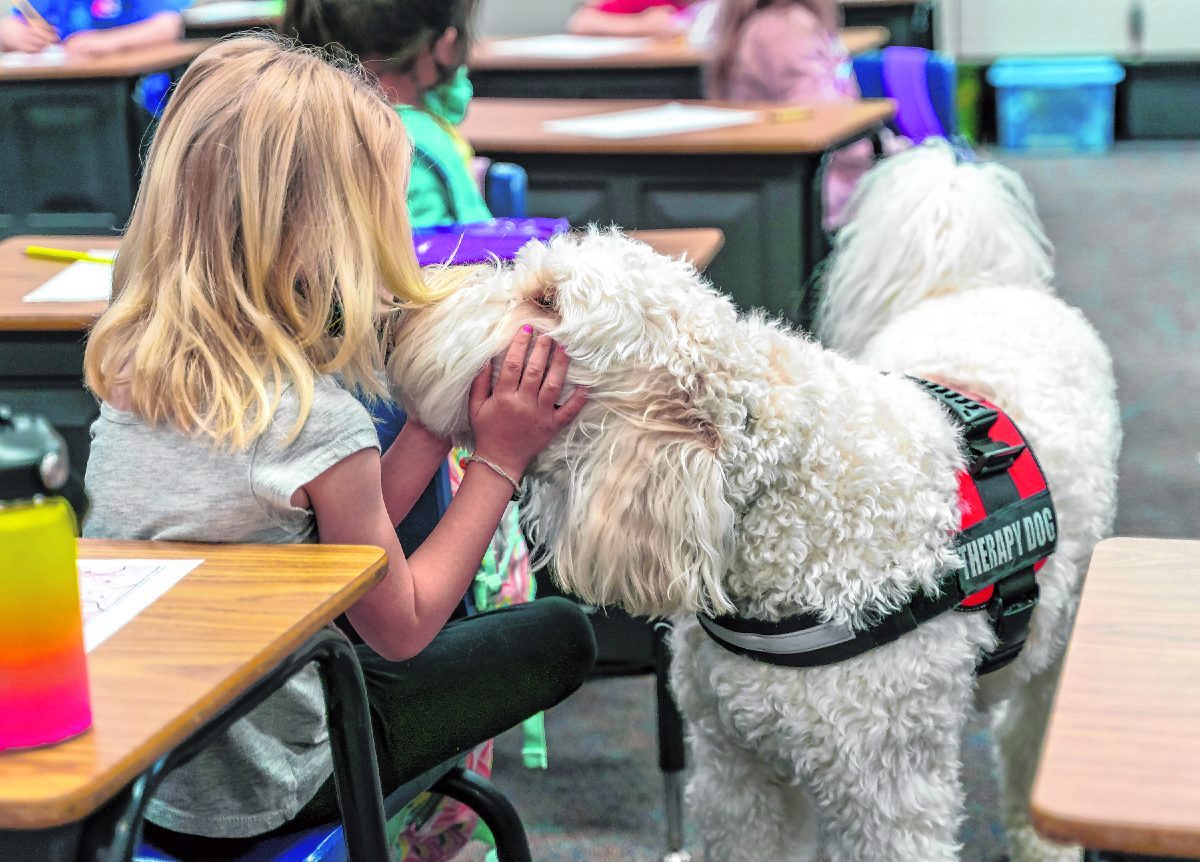Second graders work together on a math game, but one of them is having a hard time with a problem.
Sensing her struggle, a white labradoodle nudges her for encouragement.
The girl pats the labradoodle, Hiro, before going back to work with renewed focus.
Scenes like this happen every day at Northwood Elementary School, and at Webb Elementary, where Franklin Community Schools’ other therapy dog, Millie, a brown labradoodle, is stationed.
Hiro and Millie have been hard at work at the schools since the start of the school year last August. They finished up their training in March 2020, but didn’t have a chance to interact with students until students returned to classrooms for the fall semester. The dogs are just one part of the school district’s growing focus on mental health. Hiro, Millie and five human employees including Kim Spurling, the district’s director of mental health, were added to bring more mental health services to the district with funding from a 2019 referendum.
The therapy dogs add another layer to social emotional learning that is more important than ever to prepare students for life, Spurling said.
“Schools used to be a place where we can just focus on academics,” she said.
“But we have become more aware that in order to provide for the whole child, we have to bring in those emotional supports and wrap that into our academics to really see students flourish.”
The dogs have made such an impact, Franklin schools is planning to purchase three more with $93,000 in federal funding available from the second CARES Act. The amount will pay for the dogs, training and a year of food and supplies for each.
They model good behavior for students and comfort those who have a rough time in class, on the bus or at home. That impact is shown through countless anecdotes, letters that students send to the dogs and through data on student interactions.
Even students who were previously scared of dogs now love Hiro, ask about him and seek him out, said Andrea Korreck, Northwood principal and Hiro’s handler.
“His impact is really beyond data. I don’t know what the word is — magical or surreal. He enters a situation and is instantly calming. We joke around about how we’re now chopped liver. If I have Hiro it isn’t ‘hey Mrs. Korreck,’ it is ‘hey Hiro,’” she said.
Franklin therapy dogs start each day by greeting students as they get off the bus. They spend time in various classrooms where several teachers and counselors are trained to handle them.
Hiro spends a lot of time with special education students, kindergarteners who are learning how to read, students who are having a tough time and helps as needed with behavioral problems.
For Brianna Heminger’s special education students, Hiro offers support when they’re having a hard time in life or with their school work.
In Heminger’s math intervention group, Hiro offers a nudge if students get off task or he senses their anxiety because they can’t solve a problem, she said.
“The days that I haven’t had him in here I have a lot more crying,” Heminger said. “They know my expectation here is to do your best and stay positive. The positivity is hard to keep, but bringing him in here helps. And they know that when they get done they have a few minutes to snuggle with him.”
Students love Hiro enough to tell him secrets, and they have learned how to be calm in a crisis by his example, Heminger said.
“They think, ‘if Hiro can do it, so can I.’ It helps the kids to see that anyone can do great things; that we are all capable,” Heminger said.
Hiro is also a staple for kindergarten teacher Heather Kepner, whose students read to him to become more comfortable with reading out loud.
“I’ve seen an improvement with him and building confidence in them,” Kepner said. “A lot of times at this age, in kindergarten, they’re so hesitant to try it — to tackle those words and sound them out. But with Hiro, I see more confidence to attempt words they wouldn’t otherwise.”
Second grader Callie Woods and kindergartener Alice Hornbuckle both said Hiro makes them smile even if they’re struggling. He also helps them focus.
“When he comes up next to us, he’s telling us to work hard,” Woods said.
Second grader Zane Eller is one student whose behavior has been positively impacted since Hiro arrived. Eller has a tendency to get over-excited in class, stand up and use an outside voice, but with Hiro and a standing desk, his behavior is improving. Since spending time with Hiro is an incentive for good behavior, Eller tries his best to be good and earn that time with him, he said.
Over the course of a month — from Nov. 4 to Dec. 9 — Hiro helped Northwood’s behavior interventionist, Elayne Spongberg, respond to 30 behavior issues, according to data compiled by school staff. For 21 of those incidents, Hiro was highly effective at calming and regulating behavior.
In all of the incidents that involved aggressive behavior such as fighting or throwing things, that behavior stopped immediately when Hiro arrived, the data shows.
Hiro has helped Spongberg see fewer students, and students who repeatedly misbehave less often, she said.
“Hiro has this way about him. He will sit down with them and they will calm down, and he will help them talk through the problem,” Spongberg said. “Before, it would take a good chunk of time, but now we see a difference with behaviors within a minute.”





